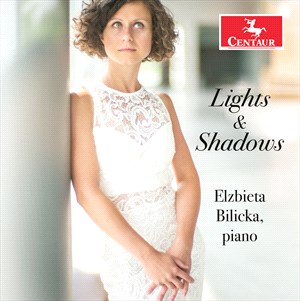
COLLECTIONS

Alexander Scriabin: Poème in F-sharp Major, Op. 32 No. 1 Maurice Ravel: Miroirs - Une barque sur l'océan - Alborada del gracioso Karol Szymanowski: Prelude in C minor, Op. 1 No. 7 Frédéric Chopin: - Ballade No. 4 in F minor, Op. 52 - Andante spianato et Grande Polonaise brillante in E-flat Major, Op. 22
Some composers write piano music. Some composers write music to be performed on the piano. These two statements may seem to express the same postulation when in fact they are two highly distinctive opposites. Alexander Scriabin and Frédéric Chopin are both prime examples of the latter argument. It's as if they perceived the piano not simply as a mechanical contraption devised as a musical instrument, but as the medium between concept and execution. They utilized all of its attributes to convey an idea, image, vision, emotion and/or state of mind. Some musicians play the piano. Some musicians express music through the piano. Polish pianist Elzbieta Bilicka is a prime example of the latter argument.
She 'gets' the motivating force within the music of Scriabin, and wallows in his subtle and yet deeply profound harmonic waters, and her delicately transparent touch allows every note to rise to the surface. The unhurried approach she brings to the Chopin Ballade enables its highly cantabile style to dominate its narrative and expose its poetic character. Her inclusion in the program of Polish composer Karol Szymanowski's Prelude in C minor is thoroughly befitting since his music was strongly influenced by his compatriot Chopin and very much inhabits the harmonic soundworld of Scriabin.
If you've seen Elzbieta Bilicka's YouTube video of La valse by Maurice Ravel, she makes obvious the fact that French music and particularly Ravel's is all about movement, motion and forward momentum. "Limpid" would best describe her interpretation of Une barque sur l'océan as you can see every sparkle of sunlight on the water's surface, and feel the sea breeze rushing through your hair. She instinctively captures the raison d'être behind the notes on the page, and makes you the listener lose track of the fact that there's a person flailing away on a keyboard. Now that's musicianship!
Elzbieta is a prize winner of many international piano competitions, and is now a member of the Piano Faculty of the Caine College of the Arts at Utah State University. I believe this to be her first recording - may there be more.
Jean-Yves Duperron - July 2021